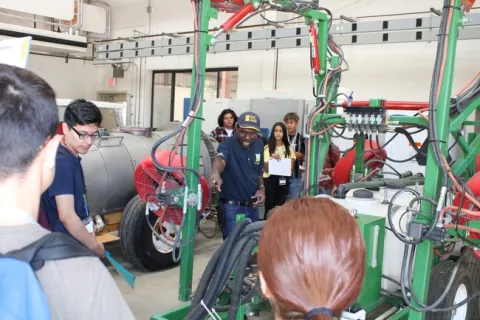After attending a summer workshop at the Agricultural Application Engineering Lab, 97% of student participants in the Reedley College Upward Bound program reported learning much or very much about spray engineering basics.
The Issue
Enabling K-12 students to experience math and science in agriculture enhances their awareness of the diverse career opportunities related to agriculture. Every year, high school students from underrepresented groups participating in the Reedley College Upward Bound Math and Science program receive two weeks of workshops at the Kearney Agricultural Research and Extension (KARE) Center to gain such experience.
How UC Delivers
Participating this year for the first time, UC Cooperative Extension Specialist Peter Ako Larbi delivered a workshop to 85 high school students in four sessions at his Agricultural Application Engineering (AgAppE) Lab located at the KARE Center. The learning objectives were for the students to become familiar with the concept of spray application and to acquire some practical basic sprayer calibration skills. The topics covered included: introduction to spray application, which covered definitions of spray, properties of spray, and demonstration of atomization; nozzles; sprayers; and hands-on exercise in backpack sprayer calibration. In each session, students volunteered to assist with demonstrations.


The Impact
At the beginning of the workshop, most of the students indicated that they were unfamiliar with the subject matter. However, the students demonstrated much excitement and pleasure during each of the sessions. Overall, 97% of all the student participants reported gaining much or very much new learning about agricultural spray engineering from the workshop. For the individual topics covered, students gained the following levels of learning: 96% for introduction to spray application, 98% for nozzles; 89% for sprayers; and 80% for hands-on exercise in backpack sprayer calibration.

The learning gained through this workshop contributed to the increased workforce retention and competency of the students who are the future workforce of our society. In 2007, the World Bank determined four effects of agricultural education and training on agricultural productivity: (1) enhanced worker productivity; (2) formal education increases grower's ability to choose prime combinations of inputs and outputs; (3) additional school influences grower's capacity to innovate and adapt new technologies; and (4) additional education facilitates interaction with commercial markets. In so doing, the AgAppE Lab has contributed to the public value of developing a qualified workforce for California.

